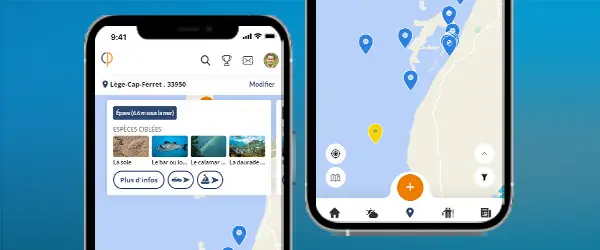
Read the article with FishingTheSpot: the queen snapper
Keep an eye on this subject!
Thousands of species spotlights and techniques but also all the local information about your city!



Meet other anglers near you and share your fishing fishing trips, afoot or on a boat, at sea or in freshwater
See the fishing tripsThe Queen Snapper

all year round
30 cm
Did you fish
this species this month?
The Queen Snapper belongs to the Lutjanidae family. It can measure up to 1-meter-long, however, it is rare to cross specimens larger than 60 centimeters. In general, juveniles weight between 5kg and 6kg, which are the most frequent catches. It has a lifespan of 8 years. It reproduces throughout the year. It can be fished all year round.
Identifying the queen snapper is not difficult, since even other morwongs do not look like them. Sometimes, however, they can be more silvery than blue. They have yellow lines around the head, a long filament on the pectoral fin and blubbery lips make the snapper distinctly identifiable.
The Queen Snapper lifestyle
It feeds mainly on small fish and squid. They are also known to feed on cowrie, hence by the discovery of good shellfish in the stomachs of queen snapper.
Snappers are believed to breed near the coast and move to deeper waters as they grow, but little is known about their reproduction or migration. It is thought that it reproduces like the other snapper.
The Queen Snapper habitat
Snappers are found from the South Australian border to Lancelin, and they range from the rocky and reef coastal country to the continental shelf.
The Queen Snapper angling
Many fishermen consider squid to be the best bait for the queen snapper, but cuttlefish, octopus and fish and squid cocktails can also be used to catch them. Queen snapper are fond of smart berleying with a berley bag attached to rocks or a berley bomb when fishing by boat. Even berleying won't keep them too far from rocks and reef bumps.
The queen snapper is found around reef and granite deposits in southern waters. Granite rocks nestle in deep waters, such as the areas surrounding the islands of the Research Archipelago off Esperance, are ideal places for anglers. Fishermen on land should look for sand patches between weeds and rocks, not necessarily large sand patches. A spoon platform will help you avoid snags and it is worth using a piece of foam in or above the bait to keep it away from the bottom (as well as rays and other pickers). Standard drift dropper platforms will mark the occasional queenies of anglers looking for oil and snappers.


